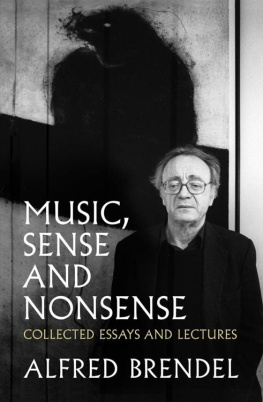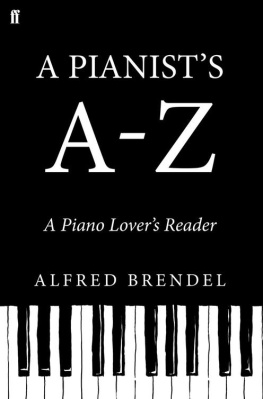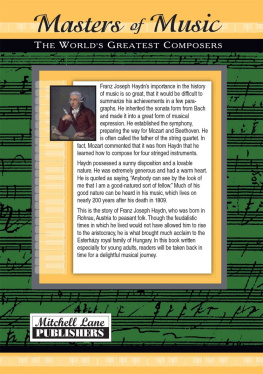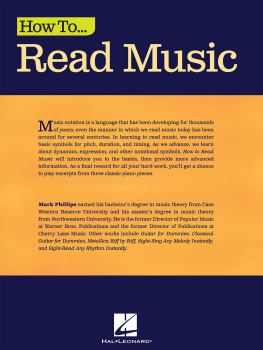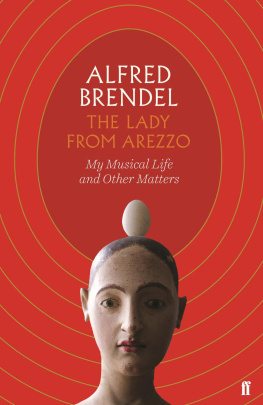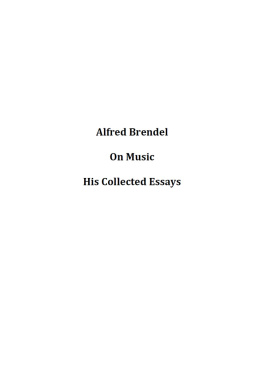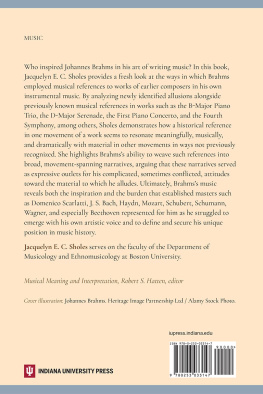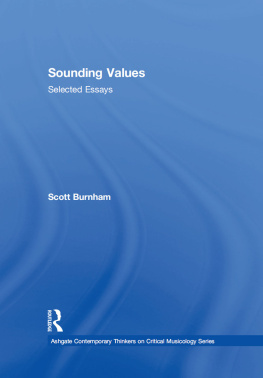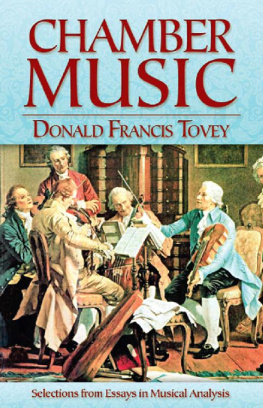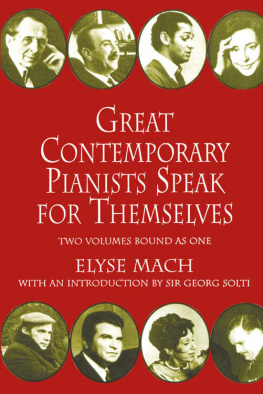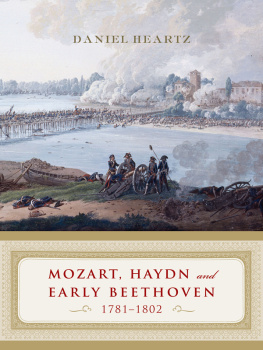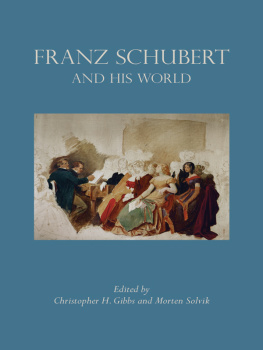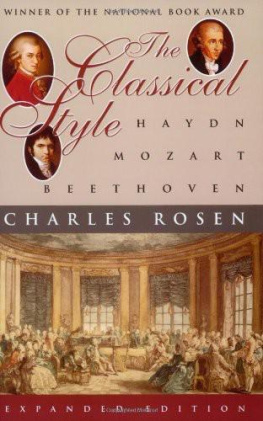Next to my musical existence, I have always liked to operate with words. In some of my essays and lectures Ive tried to clear my own mind, explain things to myself, give myself advice, and provide answers to questions to which I couldnt find satisfying ones in the literature available to me at the time of writing. Simultaneously, I entertained the hope that what I taught myself may be of some interest to others.
It gives me great pleasure to see this final compilation of my musical essays and lectures in print. My special thanks go to Jeremy Robson who started my life as a published author, and now ends it with this volume. To the edition of 2007, several pieces have been added, mostly written after I discontinued playing concerts in 2008. Repetitions of certain statements are not avoided if their inclusion seemed indispensable for the completeness of a piece. Older essays have been corrected but, on the whole, not updated. Within a sixty-year span of writing, there were bound to be changes of fact and opinion. I did not shy away from contradicting myself, or modifying some of my views. Each of my pieces has been supplied with the year of origin.
Two lectures on chamber music testify to my predilection for coaching string quartets. It has been particularly delightful to remain in touch with some of the finest ensembles of this kind and to witness the remarkable level of achievement of a number of young ones.
To mention all the musicians, friends and personalities whom I owe gratitude would fill another book. Let me single out Maria Majno for her never-ending care and perception, and Olivia Beattie and Victoria Godden for their tireless editorial work.
A Mozart Player Gives Himself Advice
Unmistakably, Mozart takes singing as his starting-point, and from this issues the uninterrupted melodiousness which shimmers through his compositions like the lovely forms of a woman through the folds of a thin dress.
FERRUCCIO BUSONI
L ET THIS BE the first warning to the Mozart performer: piano playing, be it ever so faultless, must not be considered sufficient. Mozarts piano works should be for the player a receptacle full of latent musical possibilities which often go far beyond the purely pianistic. It is not the limitations of Mozarts pianoforte (which I refuse to accept) that point the way, but rather Mozarts dynamism, colourfulness and expressiveness in operatic singing, in the orchestra, in ensembles of all kinds. For example, the first movement of Mozarts Sonata in A minor K.310 is to me a piece for symphony orchestra; the second movement resembles a vocal scene with a dramatic middle section, and the finale could be transcribed into a wind divertimento with no trouble at all.
In Mozarts piano concertos, the sound of the piano is set off more sharply against that of the orchestra. Here the human voice and the orchestral solo instrument will be the main setters of standards for the pianist. From the Mozart singer he will learn not only to sing but also to speak clearly and with meaning, to characterise, to act and react; from the string player to think in terms of up-bow and down-bow; and from the flautist or oboist to shape fast passages in a variety of articulations, instead of delivering them up to an automatic non-legato or, worse still, to an undeviating legato such as the old complete edition prescribed time and again without a shred of authenticity.
A singing line and sensuous beauty, important as they may be in Mozart, are not, however, the sole sources of bliss. To tie Mozart to a few traits is to diminish him. That great composers have manifold things to say and can use contradictions to their advantage should be evident in performances of his music. There has been altogether too much readiness to reduce Mozart to Schumanns floating Greek gracefulness or Wagners genius of light and love. Finding a balance between freshness and urbanity (He did not remain simple and did not grow over-refined, said Busoni), force and transparency, unaffectedness and irony, aloofness and intimacy, between freedom and set patterns, passion and grace, abandonment and style among the labours of the Mozart player: this is only rewarded by a stroke of good luck.
What is it that marks out Mozarts music? An attempt to draw a dividing line between Haydn and Mozart could perhaps help to answer the question. Mozart sometimes comes astonishingly close to Haydn, and Haydn to Mozart, and they shared their musical accomplishments in brotherly fashion; but they were fundamentally different in nature. I see in Haydn and Mozart the antithesis between the instrumental and vocal, motif and melody, C. P. E. and J. C. Bach, adagio and andante, caesuras (amusing and startling) and connections (seamless), daring and balance, the surprise of the unexpected and the surprise of the expected. From tranquillity, Haydn plunges deep into agitation, while Mozart does the reverse, aiming at tranquillity from nervousness.
Mozarts nervous energy his fingers were constantly drumming on the nearest chair-back can be recognised in the fidgety or spirited agitation of many final movements, as one heard them in performances by Edwin Fischer, Bruno Walter or Artur Schnabel. When Busoni denies Mozart any nervousness, I have to disagree. Like melodiousness shimmering through the folds of a dress, chaos now and then, even in Mozart, can be shimmering through the veil of order (Novalis).
The perfection of that order, the security of Mozarts sense of form, is, as Busoni puts it, almost inhuman. Let us therefore never lose sight of the humanity of this music, even when it gives itself an official and general air. The unimpeachability of his form is always balanced by the palpability of his sound, the miracle of his sound mixtures, the resoluteness of his energy, the living spirit, the heartbeat, the unsentimental warmth of his feeling.
Between Haydn the explorer and adventurer, and Schubert the sleepwalker, I see both Mozart and Beethoven as architects. But how differently they built! From the beginning of a piece, Beethoven places stone upon stone, constructing and justifying his edifice as it were in accordance with the laws of statics. Mozart, on the other hand, prefers to join together the most wonderful melodic ideas as prefabricated components; observe how in the first movement of K.271 he varies the succession of his building-blocks, to the extent of shaking them up as though in a kaleidoscope. Whereas Beethoven draws one element from another, in what might be called a procedural manner, Mozart arranges one element after another as though it could not be otherwise.
Mozart, more than most other composers, expresses himself differently in minor and in major keys. That he could also compose in a procedural manner is demonstrated by his two concertos in minor keys, K.466 and 491, which so greatly impressed Beethoven. Original cadenzas for these two works unfortunately do not exist. Neither the dynamic spaciousness of the D minor concerto nor the contrapuntal density of the C minor concerto is compatible with the usual type of improvisational cadenza in Mozarts concertos in major keys. Rather more conceivable are cadenzas in the manner of Bachs Fifth Brandenburg Concerto, which carry on the intensity of the movement, transporting it in a broad arc to the next entrance of the orchestra.

